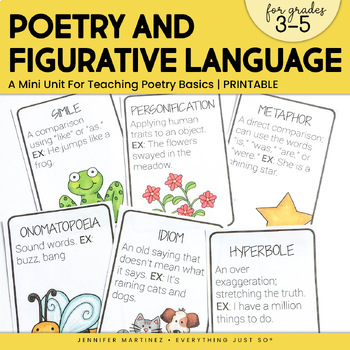Elements of Poetry - Figurative Language Mini Lessons & Activities Poetry Month
- PDF
What educators are saying
Description
Elements of Poetry and Figurative Language Unit was created for students who need a beginner’s understanding of poetry or figurative language review. Each day provides a short lesson on one element of poetry, multiple readings of a short poem, and an activity using the term of the day. Perfect for Poetry Month or any time of the year.
Included in this Elements of Poetry Figurative Language Unit:
- Ten short poetry and figurative language mini lessons. Each lesson features notes that explain a new term, how it is used, and supports for locating examples within a text.
- Nearly all lessons have a companion sheet where students practice using the term in their own writing or illustrations.
- “I Am” and Free Verse Poetry sheets. Students write their own “I Am” poem or use the blank pages to write a Free Verse poem.
- Vocabulary puzzles. Students match a definition and example to each figurative language term studied in the unit.
- Vocabulary cards. Each card lists a term, its definition, and an example.
- Vocabulary booklet. Students write a sentence telling what they knew about the word before the lesson, a sentence on what they’ve learned about the word, and draw their idea of the word in the box.
- Bookmarks with the seven types of figurative language for students to use while reading poetry.
- A vocabulary quiz on the seven figurative language terms used.
- A summative assessment. Students are asked to read two poems, note elements found in each, and then compare and contrast the two.
- Reflection. Students answer reflection questions about their experience learning about poetry.
Tips for using this Poetry Mini Lessons Unit with your upper elementary students:
- The unit was designed to take no more than thirty minutes per lesson and lasted two weeks in my classroom.
- It worked extremely well as a "front-loader" for struggling students before we began our complete unit on poetry with the whole class.
- The pages included can be used with any poems; I’ve included a list of titles as suggestions.
- Because you will be using your own poems, students’ answers will vary. However, I have included answer keys wherever possible.
What teachers are saying about this resource:
⭐⭐⭐⭐⭐ “My students loved using this resource. It was very engaging and it made them excited to work!” - Kia W
⭐⭐⭐⭐⭐ “This is an amazing addition to my poetry unit! I love how everything is broken down to teach, and also I like how you included everything relating to poetry. This will get my 4th graders thinking. This is such an easy low prep product!” - Crystal F.
⭐⭐⭐⭐⭐ “I loved this poetry unit! I never have felt confident in teaching figurative language and this helped SO much!” - Kara A.
⭐⭐⭐⭐⭐ “A quality resource that explains figurative language beautifully. Nice resources for students personal use, walls… Well paced and exactly what I was looking for. As a homeschool teacher, budget is very important. I would purchase other things by this seller based on the quality of this.” - schooledingrace
Want to see more?
☝Click the “View Preview” button above for a peek inside!
Ready to use this with your students?
✅ Click the green “Add to Cart” button above ☝
Have a question? First, check out the Q&A section for this resource and my store. This is the fastest way to get your question answered. If you don’t find your answer in either place, please email me at support@everythingjustso.org before purchasing.
© Jennifer Martinez | everything just so®. Your purchase gives you one license to use this resource with your students only. For more information about how this resource may be used, please see my current Terms of Use.





